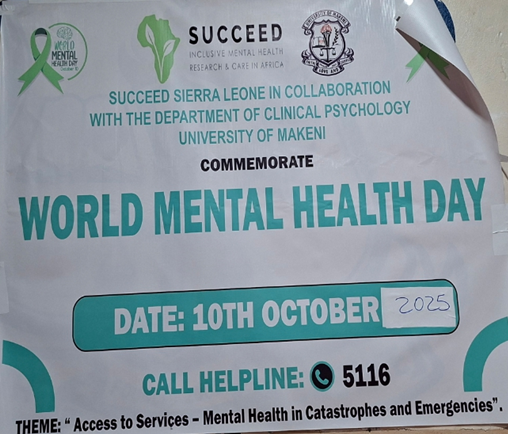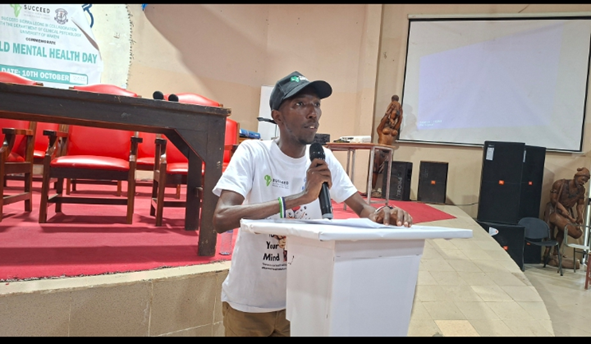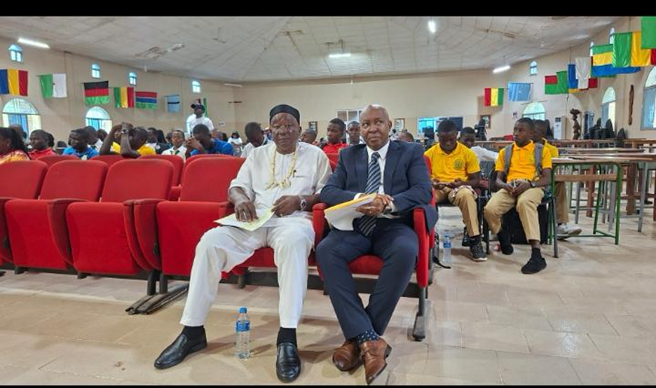By Sahrfoa Matturie
At the University of Makeni, conversations around mental health took center stage as students, health professionals, and advocates gathered to confront one of Sierra Leone’s most overlooked challenges — access to mental health services during times of crisis. The dialogue, organized by SUCCEED Sierra Leone in partnership with the university’s Department of Clinical Psychology, marked this year’s World Mental Health Day under the theme “Access to Mental Health Services in Catastrophe and Crisis.”
The event served as a reminder that while Sierra Leone continues to recover from years of conflict and disaster, the psychological wounds often remain invisible and untreated. From the scars of the civil war to the emotional toll of the Ebola epidemic, devastating mudslides, and the global COVID-19 pandemic, citizens have endured repeated traumas that have taken a significant toll on mental health.

Opening the program, Amjata Baryoh, Research Coordinator for SUCCEED Sierra Leone, expressed appreciation to participants and shared insights into the organization’s work. He explained that SUCCEED is part of a global partnership involving four universities, dedicated to conducting mental health research and translating findings into community action. “Our mission goes beyond research,” Baryoh said. “We are committed to prevention through community engagement, outreach, and awareness campaigns, including our radio talk shows that reach rural communities.”
Baryoh stressed that mental health must be seen as an integral part of overall health, especially in crisis situations where the emotional and psychological burden is greatest. He called on students and future practitioners to contribute to building a more inclusive and supportive system that prioritizes prevention and early intervention.
Delivering the keynote address, Dr. Patrick E. Turay, Medical Director of Holy Spirit Hospital, reflected on the nation’s difficult history and the mental health implications of repeated national emergencies. “Each crisis leaves behind unseen injuries,” he said. “Many people survived war and disease but continue to struggle with trauma, depression, and anxiety.”
Dr. Turay also raised alarm over the growing problem of substance abuse among Sierra Leone’s youth, warning that unemployment and social instability have deepened the mental health crisis. Despite these obstacles, he noted that progress has been made. He praised the government’s refurbishment of the Kissy Kres Yard psychiatric facility and the long-overdue reform of the 1902 Lunacy Act in 2024, which modernized mental health legislation to better reflect human rights and current medical standards.

Adding a deeply personal voice to the discussions, Nancy Amanda Stevens, a mental health survivor and advocate, shared her journey of recovery. She recounted how her community once misjudged her struggles as “spiritual possession,” leading to isolation and shame. “It was my younger brother in London who recognized that I needed medical help, not prayers or punishment,” she said. Following treatment at Connaught Hospital, Nancy became a passionate advocate, volunteering with the Mental Health Coalition and later joining SUCCEED to help others overcome stigma and access care.
The event concluded with an engaging discussion session where participants proposed strategies to bridge gaps in mental health services. Ideas included expanding community-based support systems, strengthening advocacy at the policy level, and integrating mental health education into public health and academic programs.
In his closing remarks, Amjata Baryoh reaffirmed SUCCEED Sierra Leone’s dedication to advancing research-driven, people-centered approaches. “Mental health care should not only respond to crises but also prevent them,” he emphasized. “We must build a society that understands, supports, and prioritizes mental well-being.”
As the world commemorated World Mental Health Day on October 10, the event at the University of Makeni stood as a powerful call for collective action — a call to make mental health care accessible, compassionate, and resilient enough to withstand the crises that test Sierra Leone’s strength and humanity.



